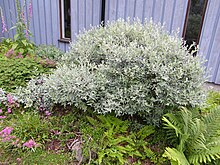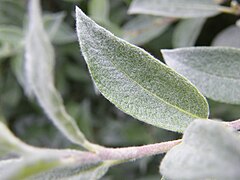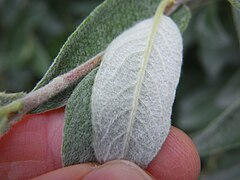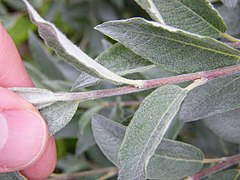Salix lapponum, the downy willow,[1][2] is a low, much-branched shrub having a wide distribution in Northern Europe, eastwards to the Altai and western Siberia, and is found as far south as the Pyrenees and Bulgaria. In Scotland, UK, it can be found on rocky mountain slopes and cliffs, generally at altitudes of 200–900 m (660–2,950 ft).[3] It grows to a height of 1.5 m (4.9 ft).
| Salix lapponum | |
|---|---|

| |
| Scientific classification | |
| Kingdom: | Plantae |
| Clade: | Tracheophytes |
| Clade: | Angiosperms |
| Clade: | Eudicots |
| Clade: | Rosids |
| Order: | Malpighiales |
| Family: | Salicaceae |
| Genus: | Salix |
| Species: | S. lapponum
|
| Binomial name | |
| Salix lapponum | |
As described in Stace[4] and BSBI[3] Salix lapponum has the following characteristics:
- Twigs hairy at first, hairless and rather glossy dark reddish brown later.
- Leaves usually lanceolate to 7 cm long by 2.5 cm wide; slightly hairy to hairy on upper side; usually densely hairy on lower side; margins entire or subentire, sometimes a little undulate.
- Petiole short, occasionally up to 1 cm long but usually less than 5mm.
-
Upper surface of leaf
-
Lower surface of leaf
-
View showing twig and leaf petioles
References
edit- ^ BSBI List 2007 (xls). Botanical Society of Britain and Ireland. Archived from the original (xls) on 2015-06-26. Retrieved 2014-10-17.
- ^ NRCS. "Salix lapponum". PLANTS Database. United States Department of Agriculture (USDA). Retrieved 1 February 2016.
- ^ a b Willows and Poplars of Great Britain and Ireland, BSBI Handbook No. 4; Meikle; 1984.
- ^ New Flora of the British Isles; Clive Stace; Third edition; 2011 printing.
Media related to Salix lapponum at Wikimedia Commons


